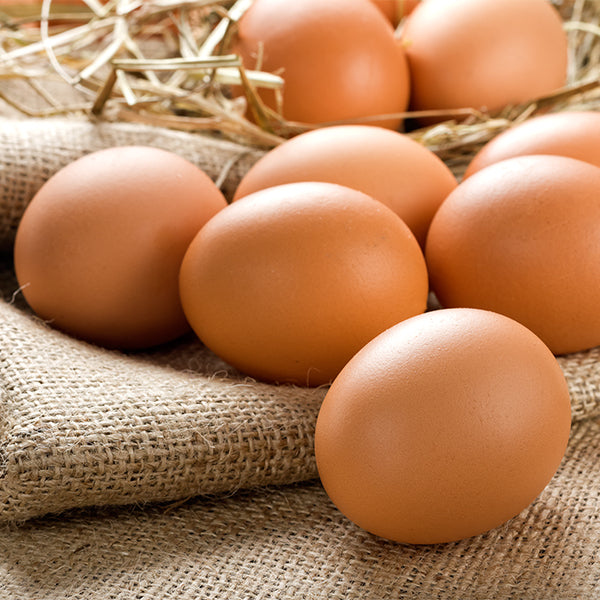Your Health Goals
Most foods provide our bodies with essential nutrients. In cases different foods will provide similar nutrients but our bodies can't absorb them in the same way. Some nutrients support common functions in our bodies, and others provide unique benefits. It's a complex area and here we simplify some of the foods and their nutrients that are the best contributors to supporting your health goals.

Immunity
The immune system is one of the most complex systems in the body, made up of a network of cells, molecules, tissues and organs all working together to protect the body.
There are many nutrients involved with the normal functioning of the immune system. For example, Vitamin A, from dairy foods, dark green leafy vegetables and orange-coloured fruit and vegetables helps support white blood cells identify pathogens (nasty bacteria that cause disease). Vitamin C found in citrus fruits, berries, green vegetables and peppers, help immune cells attack pathogens and maintain healthy skin, which acts as a barrier to infection. Other important nutrients for a healthy immune system include Vitamin B6 and Vitamin B12, Vitamin D, Folate, Iron, Selenium and Zinc. As we age our immune system becomes less efficient, so having a varied and nutritious diet is even more important.
Discover our Vegan Daily Multi-Vitamin.
Energy
The body needs energy to grow, keep warm and perform physical activity. Energy comes from the carbohydrates, fats and proteins in the food and drinks we consume.
To maintain a healthy weight ,you need to balance the amount of energy (or calories) from your diet with the amount of energy you use through physical activity. Fat contains 9 calories per gram which is more than twice as many calories per gram than protein (which has 4 calories) and carbohydrates (which has 3.75 calories). Alcohol also contains calories – 7 calories per gram but these are referred to as 'empty calories' as they have no nutritional value.
The main energy source for the body and brain is carbohydrate which is broken down into glucose (sugar) before being absorbed into your blood. Starchy carbohydrate foods such as bread, beans, pasta, potatoes and oats provide a steady, slow release of energy (glucose) into the blood as well as nutrients such as B Vitamins that help to release energy from food. Your body can also use protein as an energy source but it prefers not to as the process of breaking it down for energy is so inefficient. A small amount of fat is needed by the body to get essential fatty acids (Omega-3s) and to help the body absorb fat-soluble vitamins such as Vitamin A, Vitamin D, Vitamin E and Vitamin K. Any energy not used by the body is converted into body fat.
Discover our high strength B Vitamin Complex.


Digestion
Digestion involves breaking down the food you eat into small enough parts for your body to absorb and use for energy, growth and repairing cells. Having enough fibre in your diet is important for a healthy digestive system and preventing constipation and symptoms of IBS. For adults, at least 30g of fibre a day is recommended.
Fibre-providing foods include wholegrains, potatoes, beans and pulses, vegetables, fruits, nuts and seeds. Nerves and hormones help control the digestive process and so a variety of vitamins and minerals are required for the digestive system to function. For example, the B Vitamins help breakdown food so that the body can use it for energy and Calcium is required to make some of the digestive enzymes (which help the digestive process).
Keeping active and well hydrated can help the digestive process. It's also useful to include a wide variety of plant foods in your diet as this will provide a variety of fibres and nutrients to feed the beneficial bacteria in your gut.
Discover our pre & probiotic Gut Works
Brain
The brain relies on a steady supply of energy (in the form of glucose), ideally from foods such as wholegrains, beans, nuts, seeds, fruits and vegetables that are digested slowly to provide a steady supply of glucose to the brain.
Many nutrients are essential for normal brain function. About 60% of the brain is made of fat, and half of that fat is omega-3 fatty acids, so dietary sources of these beneficial fats, such as oily fish, are vital for the brain. The B Vitamins, Vitamin C and the minerals: Calcium, Copper, Magnesium, Iodine, Potassium and Zinc all have important roles in the normal function of the brain and nervous system.
Keeping well hydrated is important as evidence shows that even slight dehydration may affect your brain function and mood. Aim to drink 1.5 to 2 litres of fluid a day.
Discover Brain Fuel | For Memory & Focus.


Heart
A heart healthy diet is one that is high in fibre from wholegrains and fruits and vegetables, low in salt and low in fat, particularly saturated fats (from fatty cuts of meat, butter, biscuits and pastries). Unsaturated fats from oily fish, nut and seeds, and healthy oils such as olive oil and rapeseed oil are useful to include in the diet to help increase levels of good cholesterol and to help the body absorb fat-soluble vitamins.
The heart needs a variety of minerals and vitamins to function well. For example, Magnesium is vital for the heart to beat as it helps the heart muscle to contract. Potassium helps the body maintain a normal blood pressure and Vitamin K is needed for normal blood clotting.
Discover our Vegan Magnesium Citrate.
Skin, Hair & Nails
The skin is the largest organ system in the body. It forms a protective barrier to our external environment and helps the body maintain hydration and regulate our body temperature. The outer layer of skin cells re-new themselves every 28-31 days, so if you do make positive changes to your diet, you may not see the benefit to your skin for around four weeks. Learn more in our article Best foods and vitamins for glowing skin.
Several vitamins and minerals are important in skin health. Vitamin C has an important role in wound healing and is needed to make collagen (which provides structure to the skin). Inadequate intakes of some of the B Vitamins can result in the skin becoming red, scaling or discoloured.Zinc is important for maintaining healthy skin, hair and nails with foods such as meat, shellfish and nuts, being useful sources of Zinc. Selenium, which is found in fish, meat and nuts (in particular Brazil nuts) is a powerful antioxidant that helps maintain healthy hair and nails.
Discover our Vegan Daily Multi-Vitamin.


Bones
Bone is made up of a protein matrix that is strengthened with minerals such as Calcium and Phosphorus. Bone mass increases until we reach our early 20s. From the age of about 40 years, bone mass gradually decreases.
There are several nutrients that play a role in maintaining healthy bones including Protein, Vitamin C, Vitamin K, Magnesium, Manganese and Zinc. Of particular importance is Calcium, which is needed to help strengthen your bones and Vitamin D to help the body absorb Calcium. Milk and dairy foods are the best sources of Calcium. Vegans, or individuals who exclude dairy foods, should take particular care that their diet contains adequate Calcium as well as Vitamin D.
Osteoporosis (thinning of the bones due to calcium loss) is most common in older adults, particularly women after the menopause. Smoking and a high alcohol intake increase the rate of bone loss and being underweight increases the risk of osteoporosis.
Discover our Bone & Muscle Support.
Muscles
Muscles help you to control your movement, breathing, heartbeat and digestion. Regular exercise and a healthy diet are important to maintain your muscles, especially as you get older. Muscle loss is a natural symptom of ageing that starts in your 30s. From the age of 40 years, muscle mass decreases by approximately 8% every decade, increasing to 15% per decade over the age of 70 years.
Protein is particularly important for building and maintaining muscle. Spacing protein intake throughout the day helps optimise the benefit to muscle mass. Including some protein foods (such as meat, fish, soya products, eggs, dairy foods or legumes) at each meal will benefit your muscles. Vitamin D, Calcium, Magnesium and Potassium are also important for normal muscle function.


Liver
The liver is involved in around 500 different reactions in the body. These include filtering and cleaning the blood, fighting infections, producing bile which helps digest fats and getting rid of waste substances from the body. You may enjoy our article 'The best foods for detoxing your liver' and our Debloat & Detox for digestion and liver health.
Choline helps to maintain normal liver function. The main dietary sources of choline are eggs, milk, meat and fish. Vegans should take particular care to ensure they include some plant sources of Choline such as broccoli and Brussels sprouts, soya products and quinoa. Learn more in our blog 'The benefits of Choline and where to find it'.
Discover our Vegan Choline Bitartrate and our Debloat & Detox | Digestion & Liver Health.
Eyes
Your eyes need a variety of nutrients to function properly. Vitamin A is key for good vision, especially in dim light.
Vitamin A is found in animal foods such as eggs, and dairy products. However, the body can convert beta-carotene found in many fruits and vegetables into Vitamin A, so eating carrots, apricots, squash and leafy green vegetables can benefit your eye health.
Zinc also helps with night-vision and may help prevent cataracts forming. Omega-3 fatty acids help form the structure of the retina in your eye. Not getting enough omega-3 fatty acids can lead to problems with vision, and you might consider an Omega 3 supplement. Oily fish, such as salmon, trout and mackerel are the best dietary sources of the essential omega-3 fatty acids.
There are also plant sources of omega-3 such as flaxseeds, chia seeds, pumpkin seeds and walnuts that the body can convert into the beneficial omega-3s to benefit eye health.
Discover Screen Eyes | For Vision Health and our Vegan Omega 3.


Sleep
A healthy sleep pattern is vital for physical and mental health. Sleep can help support the immune system and improve our mood, concentration and decision-making. While we sleep, our bodies engage in numerous necessary functions, from self-repair and restoration to memory consolidation. Poor sleep can results in major health consequences.
A good night's sleep is much more than what time you go to sleep, what you eat plays an important role in your sleep quality. A change in eating habits can disrupt your sleep. This is why nourishing your body with a balanced diet rich in sleep-supporting nutrients is important for a restful night's sleep.
If you suffer from poor sleep, you're not alone; our research of over 12,000 women and men showed that 42% regularly struggle to sleep or are insomniacs. A shocking 73% of people have trouble sleeping at least 3 nights a week. Discover our advanced nootropic formula, Vegan Nights®. 80% of people who take it enjoy better sleep. If you experience anxiety in the evenings, we recommend our Ashwagandha KSM-66® with Vegan Nights® for better sleep.
















